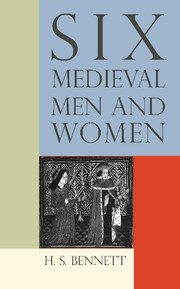Summary
The labours of generations of Chaucerian scholars have brought to light much information concerning the poet's official life as a servant of the Crown. His services at home and abroad are entered in the public records, and from them a fairly complete account of how his career shaped itself can be seen. But none of these records shows so much of the man as do the revealing lines, written by himself, in The Hous of Fame, in which we see him in his little chamber in Aldgate Tower, hearing nothing of what was going on unless his neighbours told it to him, since as his interlocutor says:
when thy labour doon al ys,
And hast mad alle thy rekenynges,
In stede of reste and newe thynges,
Thou goost hom to thy hous anoon;
And, also domb as any stoon,
Thou sittest at another book
Tyl fully daswed ys thy look,
And lyvest thus as an heremyte.
Here, forgetting the turmoil of the wharves, where he laboured as the controller of customs and subsidy of wools, skins and hides, and according to the terms of his appointment wrote the rolls with his own hand—here he was able to read and to write, with nothing to interrupt him as evening wore on till the curfew sounded from Bow Church, and
The warden of the yates gan to calle
The folk which that without the yates were,
And bad hem driven in hire bestes alle,
Or al the nyght they moste bleven there.
Meanwhile Chaucer read on in his beloved books—his old friends Virgil and Ovid; his newly acquired Dante and Boccaccio; and the French poetry past or present of The Romance of the Rose, or that of Machaut, Froissart or Deschamps.
Unlike Deschamps, alas, Chaucer does not constantly allow his own likes and dislikes or other personal matters to creep into his poems, and we must be content with this one glimpse of the poet en pantoufles. Nor do his contemporaries Langland and Gower. Langland (if we may take Long Will to be the poet) in the course of his poem gives us a few hints of himself—of his schooling and education, or of his unsatisfying life in London, but little enough.
- Type
- Chapter
- Information
- Six Medieval Men and Women , pp. 69 - 99Publisher: Cambridge University PressPrint publication year: 2013
- 1
- Cited by



